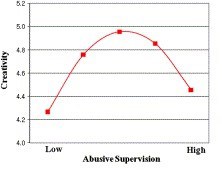I came across this article from Pacific Standard magazine the other day and thought it was discussion worthy – and certainly a little controversial.
And, it is completely at odds with the principles of creating great workplaces from the Great Place to Work Institute (Editor’s note: China is the CEO of Great Place to Work).
The article discusses a recent study from South Korea published in The Leadership Quarterly, which concludes that a moderate amount of abusive supervision in the workplace prompts employees to be more creative than they would be in an environment with either extremely abusive supervision or extremely low levels of abusive supervision.
Interesting insights
The study consisted of a survey taken by employees and supervisors of “a large government-affiliated institute” in which employees rated their supervisor’s level of abusiveness and supervisors evaluated their employee’s level of creativity. The result was a curvilinear relationship between abusive supervision and creativity.
As author Tom Jacob’s points out in Pacific Standard, we could simply take these findings as a critique of East Asian culture and dismiss them. Since our culture is so different from that of East Asia, what’s the value of this controversial study to us?
But if we look deeper than the questionable ethics though, I believe there’s some interesting insight into human nature here.
We all know the annoying and over-used adage, you’ve got to “think outside the box” to inspire innovation, but I must say that I think actually incorporating the results of this study would be taking it a little too far. Actually, it would be taking it a lot too far.
Working to find creative ways to inspire innovation from our employees is growing in importance, but to use this data to “okay” an abusive environment at work, even to okay a moderately abusive manager (which is the type of supervision the study links to the highest levels of employee creativity) wouldn’t just be crossing a best practice line, it would be crossing a moral line.
Characteristics that are key to success
Besides providing more organizational research on the potentially dark side of leadership, the study reminds us of several core characteristics of human nature that, while basic, are extremely important to our ability to be successful and creative at work, and in our lives.
- First, stress: the study reminds us that in moderate levels stress is healthy, and even necessary, for us to achieve our goals and prompt us to make new ones. It’s when stress exceeds our ability to cope (like when employees experienced high levels of abusive supervision) or is entirely absent (when employees experienced no abusive supervision) that we become overwhelmed or underwhelmed, unmotivated, and are unable to do our jobs effectively.
- Second, the importance of accountability. The data remind us that when we have forces holding us accountable (stress in this case) we are more likely to be creative. Employees in this study were held accountable by stress brought on from moderately abusive supervision, and were motivated by a desire to eliminate the tension causing the stress. Though, let’s be clear here! There are tons of different ways we can hold ourselves accountable and stress is by no means the only way.
Ultimately, I think we all experience enough stress without adding an abusive supervisor to the mix, so don’t leave here inspired to go stress out your employees in an effort to up the ante on their creativity!
Just keep in mind that, like it or not, we all do need a wee bit of stress and accountability in our lives. They may seem negative at times, but we can celebrate by knowing that they could just be the necessary ingredient to that next big idea!
This originally appeared on China Gorman’s blog at ChinaGorman.com.
